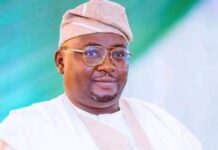The federal government has rejected yesterday’s ouster of the Guinean president, Mr. Alpha Condé, in a military coup.
The coup in Guinea comes barely three months after military officers seized power in neighbouring Mali, marking the second coup d’état in less than a year.
Special forces soldiers appeared on Sunday to have ousted Guinea’s long-serving president, telling the nation they had dissolved its government and constitution and closed its land and air borders.
The elite army unit’s head, Mamady Doumbouya, said “poverty and endemic corruption” had driven his forces to remove Condé from office.
“We have dissolved government and institutions,” Doumbouya – a former French foreign legionnaire – said on state television.
Surrounded by eight other armed soldiers, he added: “We are going to rewrite a constitution together.”
Reacting to the incident, Nigeria’s foreign affairs ministry on said in a statement that the putsch was a violation of the Economic Community of West African States (ECOWAS) protocol to which Guinea is signatory to.
“The Nigerian government is saddened by the apparent coup d’état that has taken place in the Republic of Guinea today (yesterday), in clear violation of the ECOWAS Protocol on Democracy and Good Governance.
“The government of Nigeria strongly condemns and rejects any unconstitutional change of government and therefore calls on those behind the coup to restore constitutional order without delay and protect lives and property,” the ministry said.
“I condemn the taking over by force in Guinea and I call for the immediate release of President Alpha Condé”, EU foreign affairs chief Josep Borrell tweeted.
But United Nations secretary general, Mr. Antonio Guterres said he strongly condemned “any takeover of the government by force” and called for Condé’s immediate release.
The US State Department issued a statement headed, “On the military seizure of power in Guinea,” and said: “The United States condemns today’s events in Conakry.”
It said violence and any extra-constitutional measures would only erode Guinea’s prospects for peace, stability and prosperity, and added: “These actions could limit the ability of the United States and Guinea’s other international partners to support the country as it navigates a path toward national unity and a brighter future for the Guinean people.”
Meanwhile, ECOWAS threatened to impose sections after what its chairman, Ghana’s President Nana Akufo-Addo, called an attempted coup.
The African Union said it would meet urgently and take “appropriate measures” while the foreign ministry in Nigeria, the region’s dominant power, called for a return to constitutional order.
The military officers were believed to have staged the coup on the heels of a move by the parliament to increase the salaries of politicians while slashing the budget for security forces.
Others believe his alteration of the constitution to pave way for his third term agenda did not go down too well with the military echelon, in a country with long history of coup d’état.
Some say the putsch was fanned by the level of poverty in the country despite being home to the world’s largest reserves of bauxite, the main source of aluminum for cars, beer cans and foil wrap.
In a video circulating on Facebook, Condé flanked by masked men in military fatigues, was asked by a soldier: “Excellency, have we touched a single hair of yours?” to which Condé gave no response as he looked away from the camera.
“If you see the state of our roads, of our hospitals — it’s time for us to wake up,” said Doumbouya in the address, with Guinea’s red, yellow and green flag draped on his shoulders.
The colonel promised to broker a transition government that would not harm the nation but “make love” to it.
Military sources said the president was taken to an undisclosed location and that the forces commanded by Doumbouya – whom one of the sources, a close colleague, described as calm and reserved by nature – had made several other arrests.
They included senior government officials, the sources said.
The junta that appeared to have seized power later said Condé was not harmed, his wellbeing was guaranteed and he was being given access to his doctors.
Outgoing ministers and heads of institutions were invited to a meeting on Monday (today) morning in parliament, they said in a statement read on the state broadcaster.
“Any failure to attend will be considered as a rebellion against the CNRD,” the group said referring to its chosen name, the National Rally and Development Committee (CNRD).
Condé won a third term in October after changing the constitution to allow him to stand again, triggering violent protests from the opposition.
Both Condé and Ivory Coast’s leader have moved the legislative goalposts to extend the clock on their presidencies in the past year, while Mali has experienced two military coups and Chad one.
Guinea has seen sustained economic growth during Condé’s decade in power thanks to its bauxite, iron ore, gold and diamond wealth.
But few of its citizens have seen the benefits, and critics say his government has used restrictive criminal laws to discourage dissent, while ethnic divisions and endemic graft have sharpened political rivalries.
“While the president was proclaiming everywhere that he wanted to govern differently by annihilating corruption, the embezzlement of public funds increased. The new rich were taunting us,” Alassane Diallo, a resident of Conakry, told Reuters.
“It is all this that made it easier for the military.”

























































